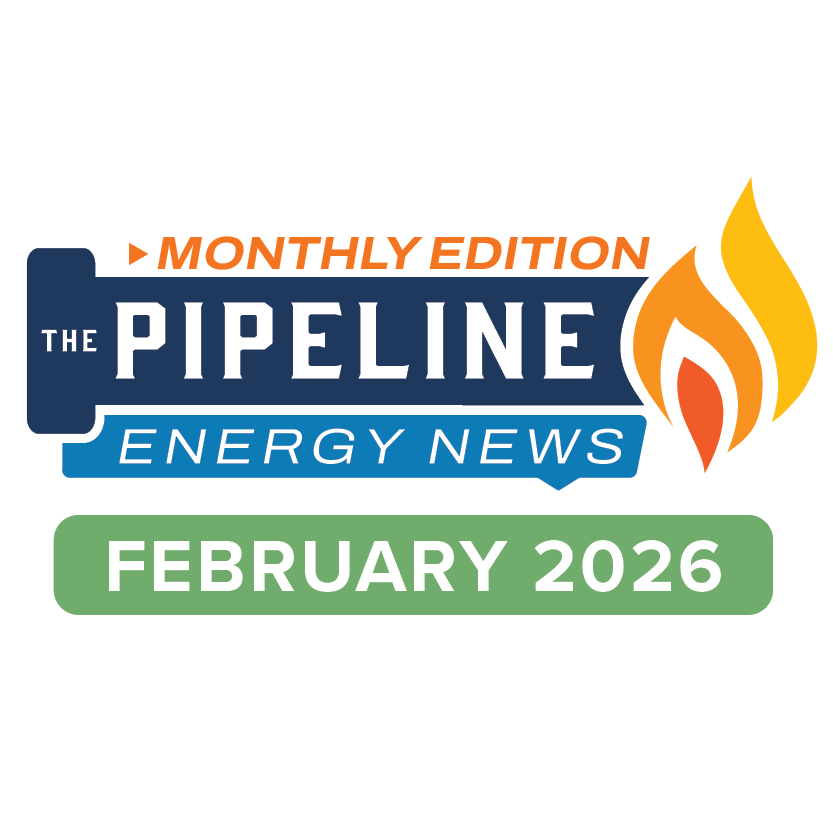
February 16, 2024
MSBA Newsletter Q1 2024 Energy News
Last month, Winter Storms Gerri and Finn swept through the country, affecting over 100 million people. During these storms, certain regions in Missouri experienced windchills of –55, while icy conditions and powerful winds affected areas throughout the whole state.
Production and Demand
Demand for natural gas in the U.S. surged as millions dealt with severe weather conditions, including snow, freezing rain, and extremely cold temperatures. During the week spanning from January 11th to January 17th, total demand soared to an average of 105.2 billion cubic feet (Bcf) per day, reflecting a nearly 25 percent increase compared to the same period last year and a 15 percent uptick from the previous week. This heightened demand led to the third-largest withdrawal of natural gas from storage on record in the U.S. Currently, the overall demand for natural gas stands at 117.1 Bcf, with forecasts suggesting the potential for another winter storm later this month, which could further boost demand.
Meanwhile, as U.S. natural gas producers reduce their operations, with a nearly 26 percent decrease in active rigs compared to last year, bringing the current count to 119 rigs. Despite the reduction in rigs, each rig is contributing to increased production. This sustained high production is occurring amidst weather-related challenges, showcasing the industry's adaptability in maintaining a balanced natural gas supply.
Looking Forward
Earlier this week, Winter Storm Kayden struck Wyoming, bringing 16 inches of snow in just 24 hours and spreading wintry conditions across the Northern Plains. It then moved on to hit the U.S. northeast and Nova Scotia, Canada. The National Weather Service (NWS) warned people to get ready for travel disruptions and floods during this recent storm. With winter not yet over, it's important to remain prepared for other potential winter storms.
In other news, the focus remains on the evolving landscape of liquefied natural gas (LNG) exports under the Biden Administration's recent permit pause on contracts for LNG developments. Despite this temporary halt, the United States has solidified its position as the leading LNG exporter, surpassing both Qatar and Australia in 2023 with a remarkable 86 million tons. Jacob Mandel, Senior Associate at Aurora Energy Research, underscores this ongoing expansion, pointing out the multitude of U.S. projects either in progress or with existing approvals. "There's a number of U.S. projects that are already under construction or that already have approval," Mandel noted, highlighting the resilient growth trajectory within the sector.
Missouri School Board Association
As the supplier of the MSBA Natural Gas Consortium, we hope you found this newsletter helpful and informative.
If you have any questions about your natural gas or the market, please contact Alan Pederson at 402-915-8378 and alan.pederson@woodriverenergy.com.
CUSTOMER CARE: Adding or removing contacts
PHONE: 720-617-1286
EMAIL: customercare@woodriverenergy.com
ACCOUNTING: Questions on invoices & payments
PHONE: 720-439-6514
EMAIL: AR@woodriverenergy.com

February 16, 2024
MSBA Newsletter Q1 2024 Energy News
Last month, Winter Storms Gerri and Finn swept through the country, affecting over 100 million people. During these storms, certain regions in Missouri experienced windchills of –55, while icy conditions and powerful winds affected areas throughout the whole state.
Production and Demand
Demand for natural gas in the U.S. surged as millions dealt with severe weather conditions, including snow, freezing rain, and extremely cold temperatures. During the week spanning from January 11th to January 17th, total demand soared to an average of 105.2 billion cubic feet (Bcf) per day, reflecting a nearly 25 percent increase compared to the same period last year and a 15 percent uptick from the previous week. This heightened demand led to the third-largest withdrawal of natural gas from storage on record in the U.S. Currently, the overall demand for natural gas stands at 117.1 Bcf, with forecasts suggesting the potential for another winter storm later this month, which could further boost demand.
Meanwhile, as U.S. natural gas producers reduce their operations, with a nearly 26 percent decrease in active rigs compared to last year, bringing the current count to 119 rigs. Despite the reduction in rigs, each rig is contributing to increased production. This sustained high production is occurring amidst weather-related challenges, showcasing the industry's adaptability in maintaining a balanced natural gas supply.
Looking Forward
Earlier this week, Winter Storm Kayden struck Wyoming, bringing 16 inches of snow in just 24 hours and spreading wintry conditions across the Northern Plains. It then moved on to hit the U.S. northeast and Nova Scotia, Canada. The National Weather Service (NWS) warned people to get ready for travel disruptions and floods during this recent storm. With winter not yet over, it's important to remain prepared for other potential winter storms.
In other news, the focus remains on the evolving landscape of liquefied natural gas (LNG) exports under the Biden Administration's recent permit pause on contracts for LNG developments. Despite this temporary halt, the United States has solidified its position as the leading LNG exporter, surpassing both Qatar and Australia in 2023 with a remarkable 86 million tons. Jacob Mandel, Senior Associate at Aurora Energy Research, underscores this ongoing expansion, pointing out the multitude of U.S. projects either in progress or with existing approvals. "There's a number of U.S. projects that are already under construction or that already have approval," Mandel noted, highlighting the resilient growth trajectory within the sector.
Missouri School Board Association
As the supplier of the MSBA Natural Gas Consortium, we hope you found this newsletter helpful and informative.
If you have any questions about your natural gas or the market, please contact Alan Pederson at 402-915-8378 and alan.pederson@woodriverenergy.com.
CUSTOMER CARE: Adding or removing contacts
PHONE: 720-617-1286
EMAIL: customercare@woodriverenergy.com
ACCOUNTING: Questions on invoices & payments
PHONE: 720-439-6514
EMAIL: AR@woodriverenergy.com
February 16, 2024
MSBA Newsletter Q1 2024 Energy News

Last month, Winter Storms Gerri and Finn swept through the country, affecting over 100 million people. During these storms, certain regions in Missouri experienced windchills of –55, while icy conditions and powerful winds affected areas throughout the whole state.
Production and Demand
Demand for natural gas in the U.S. surged as millions dealt with severe weather conditions, including snow, freezing rain, and extremely cold temperatures. During the week spanning from January 11th to January 17th, total demand soared to an average of 105.2 billion cubic feet (Bcf) per day, reflecting a nearly 25 percent increase compared to the same period last year and a 15 percent uptick from the previous week. This heightened demand led to the third-largest withdrawal of natural gas from storage on record in the U.S. Currently, the overall demand for natural gas stands at 117.1 Bcf, with forecasts suggesting the potential for another winter storm later this month, which could further boost demand.
Meanwhile, as U.S. natural gas producers reduce their operations, with a nearly 26 percent decrease in active rigs compared to last year, bringing the current count to 119 rigs. Despite the reduction in rigs, each rig is contributing to increased production. This sustained high production is occurring amidst weather-related challenges, showcasing the industry's adaptability in maintaining a balanced natural gas supply.
Looking Forward
Earlier this week, Winter Storm Kayden struck Wyoming, bringing 16 inches of snow in just 24 hours and spreading wintry conditions across the Northern Plains. It then moved on to hit the U.S. northeast and Nova Scotia, Canada. The National Weather Service (NWS) warned people to get ready for travel disruptions and floods during this recent storm. With winter not yet over, it's important to remain prepared for other potential winter storms.
In other news, the focus remains on the evolving landscape of liquefied natural gas (LNG) exports under the Biden Administration's recent permit pause on contracts for LNG developments. Despite this temporary halt, the United States has solidified its position as the leading LNG exporter, surpassing both Qatar and Australia in 2023 with a remarkable 86 million tons. Jacob Mandel, Senior Associate at Aurora Energy Research, underscores this ongoing expansion, pointing out the multitude of U.S. projects either in progress or with existing approvals. "There's a number of U.S. projects that are already under construction or that already have approval," Mandel noted, highlighting the resilient growth trajectory within the sector.
Missouri School Board Association
As the supplier of the MSBA Natural Gas Consortium, we hope you found this newsletter helpful and informative.
If you have any questions about your natural gas or the market, please contact Alan Pederson at 402-915-8378 and alan.pederson@woodriverenergy.com.
CUSTOMER CARE: Adding or removing contacts
PHONE: 720-617-1286
EMAIL: customercare@woodriverenergy.com
ACCOUNTING: Questions on invoices & payments
PHONE: 720-439-6514
EMAIL: AR@woodriverenergy.com

February 16, 2024
Last month, Winter Storms Gerri and Finn swept through the country, affecting over 100 million people. During these storms, certain regions in Missouri experienced windchills of –55, while icy conditions and powerful winds affected areas throughout the whole state.
Production and Demand
Demand for natural gas in the U.S. surged as millions dealt with severe weather conditions, including snow, freezing rain, and extremely cold temperatures. During the week spanning from January 11th to January 17th, total demand soared to an average of 105.2 billion cubic feet (Bcf) per day, reflecting a nearly 25 percent increase compared to the same period last year and a 15 percent uptick from the previous week. This heightened demand led to the third-largest withdrawal of natural gas from storage on record in the U.S. Currently, the overall demand for natural gas stands at 117.1 Bcf, with forecasts suggesting the potential for another winter storm later this month, which could further boost demand.
Meanwhile, as U.S. natural gas producers reduce their operations, with a nearly 26 percent decrease in active rigs compared to last year, bringing the current count to 119 rigs. Despite the reduction in rigs, each rig is contributing to increased production. This sustained high production is occurring amidst weather-related challenges, showcasing the industry's adaptability in maintaining a balanced natural gas supply.
Looking Forward
Earlier this week, Winter Storm Kayden struck Wyoming, bringing 16 inches of snow in just 24 hours and spreading wintry conditions across the Northern Plains. It then moved on to hit the U.S. northeast and Nova Scotia, Canada. The National Weather Service (NWS) warned people to get ready for travel disruptions and floods during this recent storm. With winter not yet over, it's important to remain prepared for other potential winter storms.
In other news, the focus remains on the evolving landscape of liquefied natural gas (LNG) exports under the Biden Administration's recent permit pause on contracts for LNG developments. Despite this temporary halt, the United States has solidified its position as the leading LNG exporter, surpassing both Qatar and Australia in 2023 with a remarkable 86 million tons. Jacob Mandel, Senior Associate at Aurora Energy Research, underscores this ongoing expansion, pointing out the multitude of U.S. projects either in progress or with existing approvals. "There's a number of U.S. projects that are already under construction or that already have approval," Mandel noted, highlighting the resilient growth trajectory within the sector.
Missouri School Board Association
As the supplier of the MSBA Natural Gas Consortium, we hope you found this newsletter helpful and informative.
If you have any questions about your natural gas or the market, please contact Alan Pederson at 402-915-8378 and alan.pederson@woodriverenergy.com.
CUSTOMER CARE: Adding or removing contacts
PHONE: 720-617-1286
EMAIL: customercare@woodriverenergy.com
ACCOUNTING: Questions on invoices & payments
PHONE: 720-439-6514
EMAIL: AR@woodriverenergy.com

February 16, 2024
MSBA Newsletter Q1 2024 Energy News
Last month, Winter Storms Gerri and Finn swept through the country, affecting over 100 million people. During these storms, certain regions in Missouri experienced windchills of –55, while icy conditions and powerful winds affected areas throughout the whole state.
Production and Demand
Demand for natural gas in the U.S. surged as millions dealt with severe weather conditions, including snow, freezing rain, and extremely cold temperatures. During the week spanning from January 11th to January 17th, total demand soared to an average of 105.2 billion cubic feet (Bcf) per day, reflecting a nearly 25 percent increase compared to the same period last year and a 15 percent uptick from the previous week. This heightened demand led to the third-largest withdrawal of natural gas from storage on record in the U.S. Currently, the overall demand for natural gas stands at 117.1 Bcf, with forecasts suggesting the potential for another winter storm later this month, which could further boost demand.
Meanwhile, as U.S. natural gas producers reduce their operations, with a nearly 26 percent decrease in active rigs compared to last year, bringing the current count to 119 rigs. Despite the reduction in rigs, each rig is contributing to increased production. This sustained high production is occurring amidst weather-related challenges, showcasing the industry's adaptability in maintaining a balanced natural gas supply.
Looking Forward
Earlier this week, Winter Storm Kayden struck Wyoming, bringing 16 inches of snow in just 24 hours and spreading wintry conditions across the Northern Plains. It then moved on to hit the U.S. northeast and Nova Scotia, Canada. The National Weather Service (NWS) warned people to get ready for travel disruptions and floods during this recent storm. With winter not yet over, it's important to remain prepared for other potential winter storms.
In other news, the focus remains on the evolving landscape of liquefied natural gas (LNG) exports under the Biden Administration's recent permit pause on contracts for LNG developments. Despite this temporary halt, the United States has solidified its position as the leading LNG exporter, surpassing both Qatar and Australia in 2023 with a remarkable 86 million tons. Jacob Mandel, Senior Associate at Aurora Energy Research, underscores this ongoing expansion, pointing out the multitude of U.S. projects either in progress or with existing approvals. "There's a number of U.S. projects that are already under construction or that already have approval," Mandel noted, highlighting the resilient growth trajectory within the sector.
Missouri School Board Association
As the supplier of the MSBA Natural Gas Consortium, we hope you found this newsletter helpful and informative.
If you have any questions about your natural gas or the market, please contact Alan Pederson at 402-915-8378 and alan.pederson@woodriverenergy.com.
CUSTOMER CARE: Adding or removing contacts
PHONE: 720-617-1286
EMAIL: customercare@woodriverenergy.com
ACCOUNTING: Questions on invoices & payments
PHONE: 720-439-6514
EMAIL: AR@woodriverenergy.com

February 16, 2024
MSBA Newsletter Q1 2024 Energy News
Last month, Winter Storms Gerri and Finn swept through the country, affecting over 100 million people. During these storms, certain regions in Missouri experienced windchills of –55, while icy conditions and powerful winds affected areas throughout the whole state.
Production and Demand
Demand for natural gas in the U.S. surged as millions dealt with severe weather conditions, including snow, freezing rain, and extremely cold temperatures. During the week spanning from January 11th to January 17th, total demand soared to an average of 105.2 billion cubic feet (Bcf) per day, reflecting a nearly 25 percent increase compared to the same period last year and a 15 percent uptick from the previous week. This heightened demand led to the third-largest withdrawal of natural gas from storage on record in the U.S. Currently, the overall demand for natural gas stands at 117.1 Bcf, with forecasts suggesting the potential for another winter storm later this month, which could further boost demand.
Meanwhile, as U.S. natural gas producers reduce their operations, with a nearly 26 percent decrease in active rigs compared to last year, bringing the current count to 119 rigs. Despite the reduction in rigs, each rig is contributing to increased production. This sustained high production is occurring amidst weather-related challenges, showcasing the industry's adaptability in maintaining a balanced natural gas supply.
Looking Forward
Earlier this week, Winter Storm Kayden struck Wyoming, bringing 16 inches of snow in just 24 hours and spreading wintry conditions across the Northern Plains. It then moved on to hit the U.S. northeast and Nova Scotia, Canada. The National Weather Service (NWS) warned people to get ready for travel disruptions and floods during this recent storm. With winter not yet over, it's important to remain prepared for other potential winter storms.
In other news, the focus remains on the evolving landscape of liquefied natural gas (LNG) exports under the Biden Administration's recent permit pause on contracts for LNG developments. Despite this temporary halt, the United States has solidified its position as the leading LNG exporter, surpassing both Qatar and Australia in 2023 with a remarkable 86 million tons. Jacob Mandel, Senior Associate at Aurora Energy Research, underscores this ongoing expansion, pointing out the multitude of U.S. projects either in progress or with existing approvals. "There's a number of U.S. projects that are already under construction or that already have approval," Mandel noted, highlighting the resilient growth trajectory within the sector.
Missouri School Board Association
As the supplier of the MSBA Natural Gas Consortium, we hope you found this newsletter helpful and informative.
If you have any questions about your natural gas or the market, please contact Alan Pederson at 402-915-8378 and alan.pederson@woodriverenergy.com.
CUSTOMER CARE: Adding or removing contacts
PHONE: 720-617-1286
EMAIL: customercare@woodriverenergy.com
ACCOUNTING: Questions on invoices & payments
PHONE: 720-439-6514
EMAIL: AR@woodriverenergy.com
Enroll in Choice Gas with Three Easy Steps
Click here to access our online Choice tool, or call our Choice gas experts at 1 (877) 790-4990.
Step 1: Enter your account number
- Your Black Hills Energy account number is located at the top right-hand corner of your bill.
Step 2: Review price offers and make your selection
Step 3: Confirm your selection and enter your control number
- You received a control number in your 2025 Choice Gas customer packet mailed to you from Black Hills Energy. If you cannot locate this, you can retrieve your control number by calling 877-245-3506 or visit choicegas.com
Once enrolled, you will be removed from supplier marketing communications within 24 hours.








